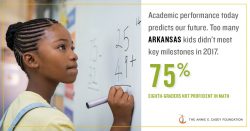
Note: This blog is second in a series of posts covering the findings in the Annie E. Casey Foundation 2019 KIDS COUNT® Data Book. To read the first blog post on economic well-being, click here, and read our press release here.
Each year, the Annie E. Casey Foundation releases the KIDS COUNT® Data Book, featuring new data on the well-being of children in Arkansas and across the country. This year Arkansas ranked 32nd in education overall, up from 33rd in 2018.
The good news is about half of 3- and 4-year-old children in Arkansas (49 percent) attended a pre-K program in 2015-2017 — on par with the national average (48 percent) and ranking our state 14th highest in the nation. Research has long proven that children who receive quality early childhood education are better prepared for K-12 education and beyond. About 85 percent of our core brain structure is formed by age 4. That’s why it’s so important to invest early in learning and development. This is especially important for children living in poverty, who have fewer opportunities and resources.
However, Arkansas is serving only 3,000 more 3- and 4-year-olds than we did in 2011. We are still unable to meet the demand of tens of thousands of working families who cannot find or afford high-quality care, especially for infants and toddlers. While Arkansas used to be a national leader in early childhood education, our progress has stalled due to a decade of nearly flat funding. Flat funding also means that more programs are struggling to maintain the highly qualified workforce that is so essential to providing a high-quality program. Meanwhile, many states have doubled down on investing early, and soon many more will pass us by.
Even when children have access to high-quality early childhood education, this foundation must be sustained through evidence-based instruction in kindergarten and beyond. Reading proficiently by the end of third grade is a proven predictor for how well a child will perform throughout the rest of his or her education. According to this year’s Data Book, 69 percent of Arkansas’s fourth graders scored below proficient in reading on the National Assessment of Educational Progress (NAEP) — a little worse than the national average of 65 percent. The NAEP is a nationally norm-referenced exam that allows us to compare a representative sample of Arkansas students’ progress with that of students in other states. Arkansas ranked 39th nationally on this measure. Sadly, our challenges are not unique: In 2017, Massachusetts was the only state where more than half of fourth graders were proficient in reading.
The news about math is worse. As the Data Book notes, “Even for young people who do not attend college, basic math skills and numerical literacy help with everyday tasks and personal financial management and improve employability.” Eighth-grade math skills — particularly Algebra — are good predictors of how prepared students are for the rigors of high school math and post-secondary learning. On the latest NAEP, 75 percent of Arkansas’s eighth graders scored below proficient in math, compared to 67 percent nationally. Arkansas is ranked 44th worst in the nation on this measure.
On a more hopeful note, Arkansas has increased the percent of high school students graduating on time from 81 percent in 2011 to 88 percent in 2017. We now perform better than the national average of 85 percent and rank 12th nationally. However, considering the data also shows that most students are struggling in both reading and math, are we really graduating students who are prepared to succeed in higher education and the workforce? The Data Book can’t answer this question, but it does show us where we need to dig deeper.
Arkansas’s future success depends upon our children’s well-being now. Positive early childhood experiences, evidence-based reading and math instruction, and high-quality afterschool and summer programs can help ensure that all kids have a strong start in life and continue to gain ground socially and academically.
Download the entire 2019 KIDS COUNT® Data Book here. You can also find Arkansas-specific information at that page.
